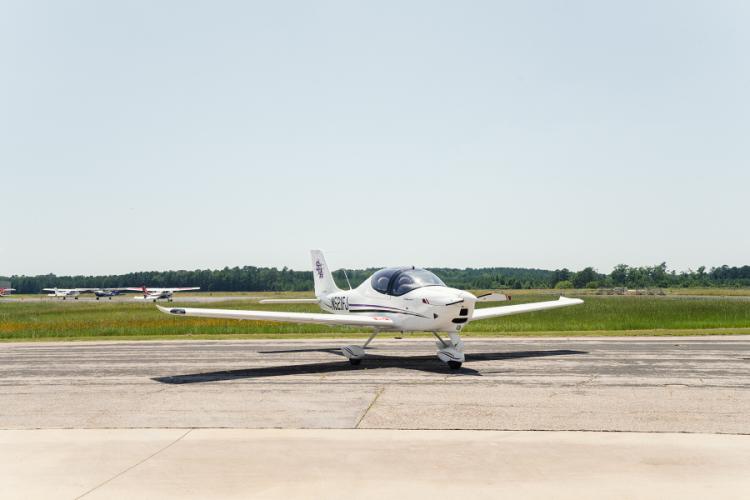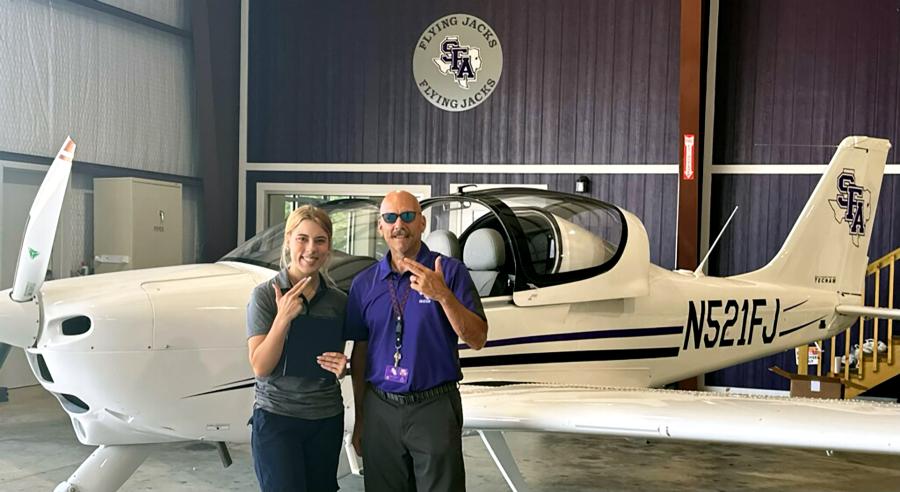NACOGDOCHES, Texas — Soaring into the future of aviation sciences, Stephen F. Austin State University has become the first institution in the United States to fly the Tecnam P-Mentor two-seat trainer airplane, equipping Lumberjacks with the most advanced training platform available in the country.
“Tecnam has been flying the airframe around the world for a couple of years now, and I was able to fly one out of Brazil to test it,” said Jack Gainer, chief instructor pilot for SFA’s aviation sciences program. “The P-Mentors that we received are even more advanced than that aircraft, and we are the first ones in the nation to have them. Not only are we the first to fly them in the United States, but they arrived in our SFA purple colors.”
Acquiring the Tecnam P-Mentors puts SFA’s flight program at the top of industry standards preparing graduates for what they will utilize out in the field.
“SFA graduates will have high-tech experience, and we’ll be the first ones to have it,” Gainer said. “Our students will be very notable when they begin searching for a career. They can say, ‘I was a Flying Jack,’ and the industry will know they are hiring graduates with experienced training.”
Offered through the James I. Perkins College of Education’s School of Human Sciences, SFA’s aviation sciences program exists through a partnership with HCH Aviation, a specialized aviation training school.
Tecnam Aircraft is an Italian aircraft manufacturer and the oldest manufacturer in the world. The Tecnam P-Mentor is a state-of-the-art training plane created for flight schools that is affordable to maintain and uses less fuel than other training airplanes.
“The delivery of the P-Mentor caps off our conversion of our fleet to an all-inclusive Tecnam Flight Program,” Kristen Conklin, HCH Aviation president and a 2009 SFA graduate, said in a Tecnam media release. “The innovation, low operational cost and aerodynamics of this platform are perfect for our students and our operations. This combined with the reliability of Tecnam Aircraft’s products made it a very easy decision to choose the P-Mentor.”
One SFA student, Josi Oujesky, a first-year aviation sciences major from Pearland, was the first student to transition from the program’s previous Tecnam Sierra plane to the P-Mentor.
“It just kind of hit me like, ‘Wow, you’re the first student in the United States to fly this plane,’” Gainer said, describing Oujesky’s experience with the plane. “Not just the first student at SFA, but the first in the United States to actually train in the P-Mentor.”
Gainer said Oujesky had a great experience with the P-Mentor and could immediately tell a difference from their previous planes.
“She said the P-Mentor felt very different and that the plane is more stable,” Gainer said. “It’s designed that way, with much more control and incredible aerodynamic technicalities. It’s just a really enjoyable airplane for students.”
The first four P-Mentors arrived at the beginning of June and an additional three will arrive before the fall semester. Two more planes are expected to arrive the following spring.
“One of the things that we’re really interested in, both SFA and HCH Aviation, is to keep a modern fleet,” Gainer said. “We want a new, clean fleet that is well maintained. In comparison to some of the other flight training universities that are still flying 1960s, ’70s or ’80s aircrafts, we will have quite a fleet.”
Additionally, all planes are available for aviation sciences students to practice in regardless of classification. SFA’s aviation sciences program starts students flying as soon as possible, and many Lumberjacks will be able to fly the P-Mentors as early as their first week in the program.
“Having students fly as soon as we can has always been one of our personal goals, because a lot of universities don’t have students fly at all for their first year,” Gainer said. “We vow to our students to have them airborne within their first two weeks, if not the first week.”
Visit SFA’s aviation sciences program webpage to learn more about the program and how to be on the cutting edge of the aviation industry.
ABOUT STEPHEN F. AUSTIN STATE UNIVERSITY
Stephen F. Austin State University, the newest member of The University of Texas System, began a century ago as a teachers’ college in Texas’ oldest town, Nacogdoches. Today, it has grown into a regional institution comprising six colleges — business, education, fine arts, forestry and agriculture, liberal and applied arts, and sciences and mathematics. Accredited by the Southern Association of Colleges and Schools, SFA enrolls approximately 11,000 students while providing the academic breadth of a state university with the personalized attention of a private school. The main campus encompasses 421 acres that include 37 academic facilities, nine residence halls, and 68 acres of recreational trails that wind through its six gardens. The university offers more than 80 bachelor’s degrees, more than 40 master’s degrees and four doctoral degrees covering more than 120 areas of study. Learn more the SFA website.
 Axe ’Em, Jacks!
Axe ’Em, Jacks!

